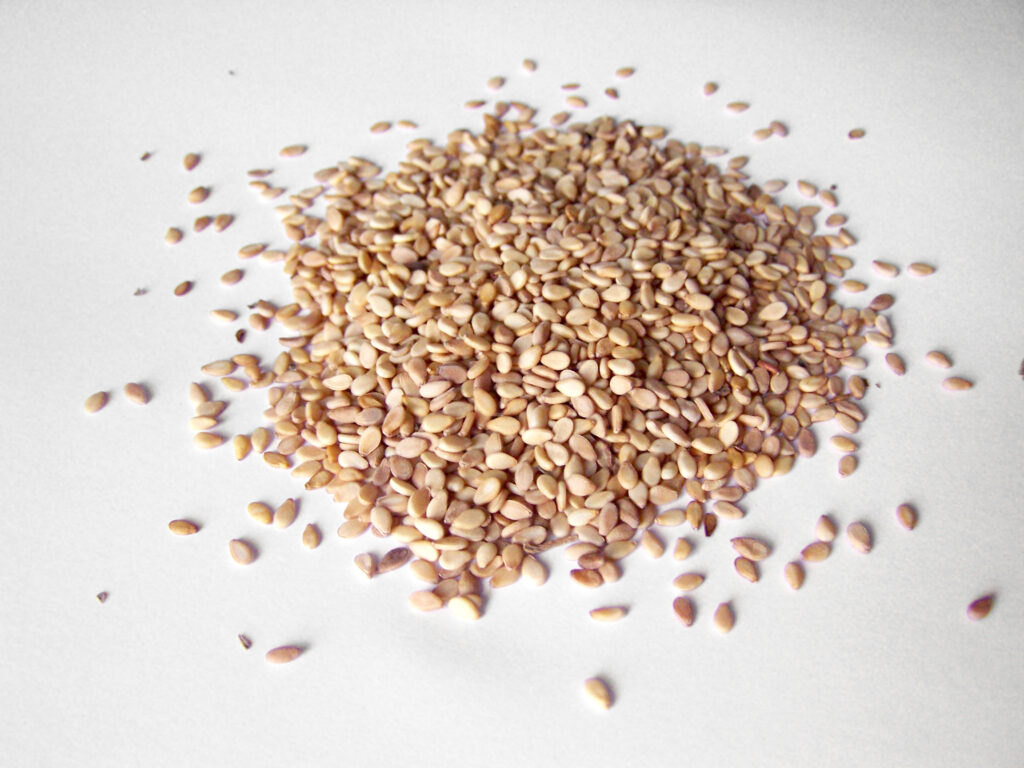Sesame seeds have been well-known worldwide for centuries but only Asian cultures seem to be appreciating their health-boosting properties in a respective manner. Although we´ve been using them in many traditional dishes, we have always perceived them as a nice crunchy bonus to the meals rather than something we can benefit from, while in reality, only one tablespoon of sesame seeds can make your life healthier and tastier right away.
Preventing cardiovascular diseases
Almost 50% of sesame seeds´ oils is oleic acid, a mono-saturated fatty acid that is known to lower LDL (bad cholesterol) and increase HDL (the good one) so that it prevents your body from hardening arteries, stroke, and coronary heart disease in general. Sesame seeds are a part of Mediterranean diet which has been proven to keep the cardiovascular diseases away, especially thanks to the unsaturated fatty acids that are present as well in extra virgin olive oil or fatty fish like salmon and tuna. So sprinkle some sesame seeds on your salmon or into the salad with olive oil and you´ll be giving yourself a pretty little healthy treat.
Vitamins and minerals beneficial for body and mind
Just one tablespoon or 15g of sesame seeds is considered a portion that will bring your body health and beauty. This portion contains 16µg of folic acid which is extremely important in pregnant women to ensure a healthy development of their unborn child, as it´s responsible for DNA synthesis. From minerals, there are 162mg of calcium which accounts for 16% of your recommended daily amount; 2mg of iron which is 30% of RDA, 58.5mg of magnesium / 15% of RDA, and interesting is also zinc with 1.3mg / 12% of RDA, and selenium with 5.8 µg / 10% of RDA. We always mention zinc and selenium regarding hair and nails´ health and beauty which of course is important; however, these two minerals have some much more important roles in our bodies. Lack of zinc can lead to frequent infections and impaired immune system, while selenium has been studied and classified as being cancer preventive. Iron, on the other hand, can be perceived as a mind repairer. 30% of RDA in only one tablespoon is amazing because it can easily get you back on track without the need to use supplements in an artificial form. Anemia from lack of iron in blood is wide-spread nowadays and causes extreme fatigue, difficulty with memory and learning as such and can leave you pretty much depressed. That´s why we recommend strewing a few sesame seeds on your food and then just feeling better. And if you´re stressed out or cannot sleep, sesame seeds will also help you with that thanks to the magnesium content. Last, but certainly not least, calcium contained in sesame will take care of your bone strength, as well as your teeth.
Be careful with the portions
As too much of anything can hurt you, sesame seeds are not an exception. If you only get one tablespoon once a week or so, you will achieve the above-mentioned benefits, plus the 3g of protein and 2g of fiber will keep you lean and muscular. However, researchers already in 1991 studied its possible negative effects on human health and the results are not very pleasant. In the article published on “US National library of medicine” website, the researchers describe the study conducted 24 years ago resulting in a conclusion that regular consumption of sesame seeds, and especially sesame seed oil (meaning more than 15 nanograms a day), can lead to colon cancer because the linoleic acid in excess reacts with the insides of the gut and promotes cancerous cells growth. In addition to this, sesame seeds can be also dangerous for a much more common reason – allergy. Since sesame belongs to the “nuts and seeds” group which is basically characteristic for its allergen properties, allergic people should be careful about any seed or nut, even if their allergy has been connected only to the pollen yet.
How to do it right then?
Since sesame seeds in excess amounts can apparently impair your body, it is better to keep it down. However, occasional treat in form of sesame seeds full of vitamins and minerals can only do your body good. You can sprinkle it into your cereal bowl with milk in the morning, crash it down to make tahini you can later use as a spread substitute for butter, sprinkle it on your salad, or add it into your falafel dough or even cookie dough. These meals will add some variety into your diet as well as the crunchy nutty taste. Just remember not to overdo it and maybe eat sesame seeds only once a week with sushi and on special occasions.

